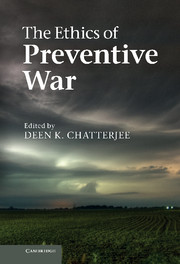27 results
Contributors
-
-
- Book:
- The Cambridge Dictionary of Philosophy
- Published online:
- 05 August 2015
- Print publication:
- 27 April 2015, pp ix-xxx
-
- Chapter
- Export citation
PART III - CRITIQUES OF PREVENTIVE WAR
-
- Book:
- The Ethics of Preventive War
- Published online:
- 05 April 2013
- Print publication:
- 04 April 2013, pp 119-120
-
- Chapter
- Export citation
Contributors
-
- Book:
- The Ethics of Preventive War
- Published online:
- 05 April 2013
- Print publication:
- 04 April 2013, pp ix-xiv
-
- Chapter
- Export citation
Index
-
- Book:
- The Ethics of Preventive War
- Published online:
- 05 April 2013
- Print publication:
- 04 April 2013, pp 251-255
-
- Chapter
- Export citation

The Ethics of Preventive War
-
- Published online:
- 05 April 2013
- Print publication:
- 04 April 2013
Contents
-
- Book:
- The Ethics of Preventive War
- Published online:
- 05 April 2013
- Print publication:
- 04 April 2013, pp vii-viii
-
- Chapter
- Export citation
Bibliography
-
- Book:
- The Ethics of Preventive War
- Published online:
- 05 April 2013
- Print publication:
- 04 April 2013, pp 240-250
-
- Chapter
- Export citation
1 - Introduction
-
-
- Book:
- The Ethics of Preventive War
- Published online:
- 05 April 2013
- Print publication:
- 04 April 2013, pp 1-12
-
- Chapter
- Export citation
Frontmatter
-
- Book:
- The Ethics of Preventive War
- Published online:
- 05 April 2013
- Print publication:
- 04 April 2013, pp i-vi
-
- Chapter
- Export citation
PART I - CONCEPTUAL, NORMATIVE, AND METHODOLOGICAL TERRAINS
-
- Book:
- The Ethics of Preventive War
- Published online:
- 05 April 2013
- Print publication:
- 04 April 2013, pp 13-14
-
- Chapter
- Export citation
PART II - INTERNATIONAL LAW
-
- Book:
- The Ethics of Preventive War
- Published online:
- 05 April 2013
- Print publication:
- 04 April 2013, pp 63-64
-
- Chapter
- Export citation
12 - Enough about just war, what about just peace? The doctrine of preventive non-intervention
-
-
- Book:
- The Ethics of Preventive War
- Published online:
- 05 April 2013
- Print publication:
- 04 April 2013, pp 214-239
-
- Chapter
- Export citation
PART IV - BEYOND PREVENTIVE WAR: EXPLORING OTHER OPTIONS
-
- Book:
- The Ethics of Preventive War
- Published online:
- 05 April 2013
- Print publication:
- 04 April 2013, pp 187-188
-
- Chapter
- Export citation
Poverty and Morality: Religious and Secular Perspectives, edited by William A. Galston and Peter H. Hoffenberg (New York: Cambridge University Press, 2010), 312 pp., $97 cloth, $29.99 paper.
-
- Journal:
- Ethics & International Affairs / Volume 27 / Issue 1 / Spring 2013
- Published online by Cambridge University Press:
- 14 February 2013, pp. 110-112
-
- Article
- Export citation
The Moral Foundations of Politics, Ian Shapiro (New Haven: Yale University Press, 2003), 289 pp., $25 cloth.
-
- Journal:
- Ethics & International Affairs / Volume 18 / Issue 1 / March 2004
- Published online by Cambridge University Press:
- 28 September 2012, pp. 109-112
-
- Article
- Export citation
Justice, Legitimacy, and Self-Determination: Moral Foundations for International Law, Allen Buchanan (New York: Oxford University Press, 2004), 507 pp., $35 cloth.
-
- Journal:
- Ethics & International Affairs / Volume 19 / Issue 2 / September 2005
- Published online by Cambridge University Press:
- 28 September 2012, pp. 123-126
-
- Article
- Export citation
PART III - THE LAW OF PEOPLES
-
- Book:
- The Ethics of Assistance
- Published online:
- 05 June 2012
- Print publication:
- 08 April 2004, pp 145-146
-
- Chapter
- Export citation
Frontmatter
-
- Book:
- The Ethics of Assistance
- Published online:
- 05 June 2012
- Print publication:
- 08 April 2004, pp i-iv
-
- Chapter
- Export citation
PART II - COMMUNITIES AND OBLIGATIONS
-
- Book:
- The Ethics of Assistance
- Published online:
- 05 June 2012
- Print publication:
- 08 April 2004, pp 99-100
-
- Chapter
- Export citation
Contents
-
- Book:
- The Ethics of Assistance
- Published online:
- 05 June 2012
- Print publication:
- 08 April 2004, pp v-vi
-
- Chapter
- Export citation



